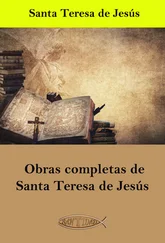2This must be an error. See ch. i. § 7, note 7.
3There is a difficulty about this. The Bollandists maintain that she went to the monastery of the Incarnation in the year 1533. On the other hand Ribera, her most accurate biographer--with whom Fra Jerome agrees,--says that she left her father's house in 1535, when she was more than twenty years of age; Yepes, that she was not yet twenty; and the Second Relation of the Rota, that she was in her twentieth year. The Bull of Canonisation and the Office in the Breviary also say that she was in her twentieth year, that is, A.D. 1534. The Chronicler of the Order differs from all and assigns the year 1536 as the year in which she entered the monastery.
The Life
of the
Holy Mother Teresa of Jesus.
Table of Contents
Written by Herself.
Table of Contents
As I have been commanded and left at liberty to describe at length my way of prayer, and the workings of the grace of our Lord within me, I could wish that I had been allowed at the same time to speak distinctly and in detail of my grievous sins and wicked life. But it has not been so willed; on the contrary, I am laid herein under great restraint; and therefore, for the love of our Lord, I beg of every one who shall read this story of my life 1to keep in mind how wicked it has been; and how, among the Saints who were converted to God, I have never found one in whom I can have any comfort. For I see that they, after our Lord had called them, never fell into sin again; I not only became worse, but, as it seems to me, deliberately withstood the graces of His Majesty, because I saw that I was thereby bound to serve Him more earnestly, knowing, at the same time, that of myself I could not pay the least portion of my debt.
May He be blessed for ever Who waited for me so long! I implore Him with my whole heart to send me His grace, so that in all clearness and truth I may give this account of myself which my confessors command me to give; and even our Lord Himself, I know it, has also willed it should be given for some time past, but I had not the courage to attempt it. And I pray it may be to His praise and glory, and a help to my confessors; who, knowing me better, may succour my weakness, so that I may render to our Lord some portion of the service I owe Him. May all creatures praise Him for ever! Amen.
1The Saint, in a letter written November 19, 1581, to Don Pedro de Castro, then canon of Avila, speaking of this book, calls it the book "Of the compassions of God"-- Y ansi intitule ese libro De las Misericordias de Dios. That letter is the 358th in the edition of Don Vicente de la Fuente, and the 8th of the fourth volume of the Doblado edition of Madrid. "Vitam igitur suam internam et supernaturalem magis pandit quam narrat actiones suas mere humanas" ( Bollandists , n. 2).
Table of Contents
Childhood and Early Impressions. The Blessing of Pious Parents. Desire of Martyrdom. Death of the Saint's Mother.
1. I had a father and mother, who were devout and feared God. Our Lord also helped me with His grace. All this would have been enough to make me good, if I had not been so wicked. My father was very much given to the reading of good books; and so he had them in Spanish, that his children might read them. These books, with my mother's carefulness to make us say our prayers, and to bring us up devout to our Lady and to certain Saints, began to make me think seriously when I was, I believe, six or seven years old. It helped me, too, that I never saw my father and mother respect anything but goodness. They were very good themselves. My father was a man of great charity towards the poor, and compassion for the sick, and also for servants; so much so, that he never could be persuaded to keep slaves, for he pitied them so much: and a slave belonging to one of his brothers being once in his house, was treated by him with as much tenderness as his own children. He used to say that he could not endure the pain of seeing that she was not free. He was a man of great truthfulness; nobody ever heard him swear or speak ill of any one; his life was most pure.
2. My mother also was a woman of great goodness, and her life was spent in great infirmities. She was singularly pure in all her ways. Though possessing great beauty, yet was it never known that she gave reason to suspect that she made any account whatever of it; for, though she was only three-and-thirty years of age when she died, her apparel was already that of a woman advanced in years. She was very calm, and had great sense. The sufferings she went through during her life were grievous, her death most Christian. 1
3. We were three sisters and nine brothers. 2All, by the mercy of God, resembled their parents in goodness except myself, though I was the most cherished of my father. And, before I began to offend God, I think he had some reason,--for I am filled with sorrow whenever I think of the good desires with which our Lord inspired me, and what a wretched use I made of them. Besides, my brothers never in any way hindered me in the service of God.
4. One of my brothers was nearly of my own age; 3and he it was whom I most loved, though I was very fond of them all, and they of me. He and I used to read Lives of Saints together. When I read of martyrdom undergone by the Saints for the love of God, it struck me that the vision of God was very cheaply purchased; and I had a great desire to die a martyr's death,--not out of any love of Him of which I was conscious, but that I might most quickly attain to the fruition of those great joys of which I read that they were reserved in Heaven; and I used to discuss with my brother how we could become martyrs. We settled to go together to the country of the Moors, 4begging our way for the love of God, that we might be there beheaded; 5and our Lord, I believe, had given us courage enough, even at so tender an age, if we could have found the means to proceed; but our greatest difficulty seemed to be our father and mother.
5. It astonished us greatly to find it said in what we were reading that pain and bliss were everlasting. We happened very often to talk about this; and we had a pleasure in repeating frequently, "For ever, ever, ever." Through the constant uttering of these words, our Lord was pleased that I should receive an abiding impression of the way of truth when I was yet a child.
6. As soon as I saw it was impossible to go to any place where people would put me to death for the sake of God, my brother and I set about becoming hermits; and in an orchard belonging to the house we contrived, as well as we could, to build hermitages, by piling up small stones one on the other, which fell down immediately; and so it came to pass that we found no means of accomplishing our wish. Even now, I have a feeling of devotion when I consider how God gave me in my early youth what I lost by my own fault. I gave alms as I could--and I could but little. I contrived to be alone, for the sake of saying my prayers 6--and they were many--especially the Rosary, to which my mother had a great devotion, and had made us also in this like herself. I used to delight exceedingly, when playing with other children, in the building of monasteries, as if we were nuns; and I think I wished to be a nun, though not so much as I did to be a martyr or a hermit.
7. I remember that, when my mother died, 7I was about twelve years old--a little less. When I began to understand my loss, I went in my affliction to an image of our Lady, 8and with many tears implored her to be my mother. I did this in my simplicity, and I believe that it was of service to me; for I have by experience found the royal Virgin help me whenever I recommended myself to her; and at last she has brought me back to herself. It distresses me now, when I think of, and reflect on, that which kept me from being earnest in the good desires with which I began.
Читать дальше












